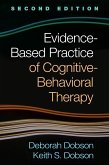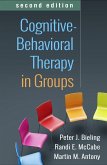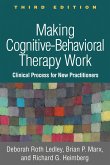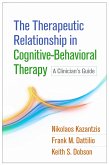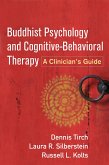Lizabeth Roemer, Susan M Orsillo
Acceptance-Based Behavioral Therapy
Treating Anxiety and Related Challenges
Schade – dieser Artikel ist leider ausverkauft. Sobald wir wissen, ob und wann der Artikel wieder verfügbar ist, informieren wir Sie an dieser Stelle.
Lizabeth Roemer, Susan M Orsillo
Acceptance-Based Behavioral Therapy
Treating Anxiety and Related Challenges
- Gebundenes Buch
Andere Kunden interessierten sich auch für
![Acceptance-Based Behavioral Therapy Acceptance-Based Behavioral Therapy]() Lizabeth RoemerAcceptance-Based Behavioral Therapy52,99 €
Lizabeth RoemerAcceptance-Based Behavioral Therapy52,99 €![Evidence-Based Practice of Cognitive-Behavioral Therapy Evidence-Based Practice of Cognitive-Behavioral Therapy]() Deborah Dobson (Canada University of Calgary)Evidence-Based Practice of Cognitive-Behavioral Therapy47,99 €
Deborah Dobson (Canada University of Calgary)Evidence-Based Practice of Cognitive-Behavioral Therapy47,99 €![Cognitive-Behavioral Therapy in Groups Cognitive-Behavioral Therapy in Groups]() Peter J. Bieling (McMaster University and St. Joseph's HealthcareCognitive-Behavioral Therapy in Groups101,99 €
Peter J. Bieling (McMaster University and St. Joseph's HealthcareCognitive-Behavioral Therapy in Groups101,99 €![Rumination-Focused Cognitive-Behavioral Therapy for Depression Rumination-Focused Cognitive-Behavioral Therapy for Depression]() Edward R. Watkins (Edward R. Watkins, PhD, Director, Mood DisordersRumination-Focused Cognitive-Behavioral Therapy for Depression69,99 €
Edward R. Watkins (Edward R. Watkins, PhD, Director, Mood DisordersRumination-Focused Cognitive-Behavioral Therapy for Depression69,99 €![Making Cognitive-Behavioral Therapy Work Making Cognitive-Behavioral Therapy Work]() Deborah Roth Ledley (United States private practice)Making Cognitive-Behavioral Therapy Work42,99 €
Deborah Roth Ledley (United States private practice)Making Cognitive-Behavioral Therapy Work42,99 €![The Therapeutic Relationship in Cognitive-Behavioral Therapy The Therapeutic Relationship in Cognitive-Behavioral Therapy]() Nikolaos Kazantzis (Australia Monash University)The Therapeutic Relationship in Cognitive-Behavioral Therapy52,99 €
Nikolaos Kazantzis (Australia Monash University)The Therapeutic Relationship in Cognitive-Behavioral Therapy52,99 €![Buddhist Psychology and Cognitive-Behavioral Therapy Buddhist Psychology and Cognitive-Behavioral Therapy]() Dennis TirchBuddhist Psychology and Cognitive-Behavioral Therapy57,99 €
Dennis TirchBuddhist Psychology and Cognitive-Behavioral Therapy57,99 €-
-
Produktdetails
- Verlag: Guilford Publications
- Seitenzahl: 318
- Erscheinungstermin: 24. Juli 2020
- Englisch
- Abmessung: 254mm x 180mm x 23mm
- Gewicht: 798g
- ISBN-13: 9781462543946
- ISBN-10: 1462543944
- Artikelnr.: 58567099
- Herstellerkennzeichnung
- Libri GmbH
- Europaallee 1
- 36244 Bad Hersfeld
- gpsr@libri.de
Lizabeth Roemer, PhD, is Professor of Psychology at the University of Massachusetts Boston, where she is actively involved in research and clinical training of doctoral students in clinical psychology. Dr. Roemer's research examines how people understand, react to, and cope with intense emotional reactions, most often in the contexts of anxiety disorders and posttraumatic functioning. She also supports her students in examining the relevance of cultural and contextual factors in these phenomena, with an emphasis on helping people thrive in the face of discrimination and racism. Her research team has a recent focus on dissemination, health promotion, and identifying and addressing barriers to care. Dr. Roemer has published over 120 journal articles and book chapters. Her books with Susan M. Orsillo include The Mindful Way through Anxiety and Worry Less, Live More (for general readers) and Acceptance-Based Behavioral Therapy (for mental health professionals). Their website is www.mindfulwaythroughanxiety.com. Susan M. Orsillo, PhD, is Professor of Psychology at Suffolk University in Boston, where she is actively involved in the education, training, and professional development of undergraduates and doctoral students in clinical psychology. Dr. Orsillo studies how acceptance-based behavioral therapy-informed strategies can help buffer against contextual stressors, build resilience, improve psychosocial functioning, and enhance quality of life. Her research team also has a focus on improving widespread access to evidence-based care. Dr. Orsillo has published over 120 journal articles and book chapters. Her books with Lizabeth Roemer include The Mindful Way through Anxiety and Worry Less, Live More (for general readers) and Acceptance-Based Behavioral Therapy (for mental health professionals). Their website is www.mindfulwaythroughanxiety.com.
I. Setting the Stage for Change
1. Overview of an Acceptance-Based Behavioral Model of Clinical Problems
2. Gathering Clinical Information to Prepare a Case Formulation
3. Sharing Case Formulation and Treatment Plan: Setting the Stage for
Therapy
II. Cultivating Acceptance-Based Skills and Clarifying Values
4. The Therapeutic Relationship: A Context and a Mechanism for Change
5. Psychoeducation to Cultivate Acceptance
6. Mindfulness and Other Experiential Methods
7. Using ABBT Methods to Cultivate Self-Compassion
8. Articulating and Clarifying Personal Values
III. Putting It All Together: Promoting Mindful, Valued Action
9. Integrating the Three Goals of ABBT into Each Session
10. Working with Contextual Inequities and External Barriers to
Values-Based Actions
11. Evaluating Progress, Relapse Prevention, and Ending Treatment
Appendix A: Measures That Can Be Used to Assess ABBT Model-Specific
Processes
Appendix B: Mindfulness Exercises
Appendix C: A Model of Integration of Topics, Exercises, and Forms across
Sessions
References
Index
List of Audio Tracks:
- Mindfulness of Breath (3 minutes)
- Mindfulness of Sounds (5 minutes)
- Mindfulness of Physical Sensations (3 minutes)
- Mindfulness-Based Progressive Muscle Relaxation: Instructions (11
minutes)
- Progressive Muscle Relaxation, 16 Muscle Group Exercise (37 minutes)
- Progressive Muscle Relaxation, 7 Muscle Group Exercise (19 minutes)
- Progressive Muscle Relaxation, 4 Muscle Group Exercise (13 minutes)
- Mindfulness of Emotions (5 minutes)
- Mindfulness of Emotions and Physical Sensations (6 minutes)
- Mindfulness of Clouds and Sky (7 minutes)
- Mountain Meditation (8 minutes)
- Inviting a Difficulty In and Working It through the Body (6 minutes)
- Your Personal Experience with Self-Compassion (4 minutes)
- Mindful Observation of Self-Critical Thoughts (4 minutes)
1. Overview of an Acceptance-Based Behavioral Model of Clinical Problems
2. Gathering Clinical Information to Prepare a Case Formulation
3. Sharing Case Formulation and Treatment Plan: Setting the Stage for
Therapy
II. Cultivating Acceptance-Based Skills and Clarifying Values
4. The Therapeutic Relationship: A Context and a Mechanism for Change
5. Psychoeducation to Cultivate Acceptance
6. Mindfulness and Other Experiential Methods
7. Using ABBT Methods to Cultivate Self-Compassion
8. Articulating and Clarifying Personal Values
III. Putting It All Together: Promoting Mindful, Valued Action
9. Integrating the Three Goals of ABBT into Each Session
10. Working with Contextual Inequities and External Barriers to
Values-Based Actions
11. Evaluating Progress, Relapse Prevention, and Ending Treatment
Appendix A: Measures That Can Be Used to Assess ABBT Model-Specific
Processes
Appendix B: Mindfulness Exercises
Appendix C: A Model of Integration of Topics, Exercises, and Forms across
Sessions
References
Index
List of Audio Tracks:
- Mindfulness of Breath (3 minutes)
- Mindfulness of Sounds (5 minutes)
- Mindfulness of Physical Sensations (3 minutes)
- Mindfulness-Based Progressive Muscle Relaxation: Instructions (11
minutes)
- Progressive Muscle Relaxation, 16 Muscle Group Exercise (37 minutes)
- Progressive Muscle Relaxation, 7 Muscle Group Exercise (19 minutes)
- Progressive Muscle Relaxation, 4 Muscle Group Exercise (13 minutes)
- Mindfulness of Emotions (5 minutes)
- Mindfulness of Emotions and Physical Sensations (6 minutes)
- Mindfulness of Clouds and Sky (7 minutes)
- Mountain Meditation (8 minutes)
- Inviting a Difficulty In and Working It through the Body (6 minutes)
- Your Personal Experience with Self-Compassion (4 minutes)
- Mindful Observation of Self-Critical Thoughts (4 minutes)
I. Setting the Stage for Change
1. Overview of an Acceptance-Based Behavioral Model of Clinical Problems
2. Gathering Clinical Information to Prepare a Case Formulation
3. Sharing Case Formulation and Treatment Plan: Setting the Stage for
Therapy
II. Cultivating Acceptance-Based Skills and Clarifying Values
4. The Therapeutic Relationship: A Context and a Mechanism for Change
5. Psychoeducation to Cultivate Acceptance
6. Mindfulness and Other Experiential Methods
7. Using ABBT Methods to Cultivate Self-Compassion
8. Articulating and Clarifying Personal Values
III. Putting It All Together: Promoting Mindful, Valued Action
9. Integrating the Three Goals of ABBT into Each Session
10. Working with Contextual Inequities and External Barriers to
Values-Based Actions
11. Evaluating Progress, Relapse Prevention, and Ending Treatment
Appendix A: Measures That Can Be Used to Assess ABBT Model-Specific
Processes
Appendix B: Mindfulness Exercises
Appendix C: A Model of Integration of Topics, Exercises, and Forms across
Sessions
References
Index
List of Audio Tracks:
- Mindfulness of Breath (3 minutes)
- Mindfulness of Sounds (5 minutes)
- Mindfulness of Physical Sensations (3 minutes)
- Mindfulness-Based Progressive Muscle Relaxation: Instructions (11
minutes)
- Progressive Muscle Relaxation, 16 Muscle Group Exercise (37 minutes)
- Progressive Muscle Relaxation, 7 Muscle Group Exercise (19 minutes)
- Progressive Muscle Relaxation, 4 Muscle Group Exercise (13 minutes)
- Mindfulness of Emotions (5 minutes)
- Mindfulness of Emotions and Physical Sensations (6 minutes)
- Mindfulness of Clouds and Sky (7 minutes)
- Mountain Meditation (8 minutes)
- Inviting a Difficulty In and Working It through the Body (6 minutes)
- Your Personal Experience with Self-Compassion (4 minutes)
- Mindful Observation of Self-Critical Thoughts (4 minutes)
1. Overview of an Acceptance-Based Behavioral Model of Clinical Problems
2. Gathering Clinical Information to Prepare a Case Formulation
3. Sharing Case Formulation and Treatment Plan: Setting the Stage for
Therapy
II. Cultivating Acceptance-Based Skills and Clarifying Values
4. The Therapeutic Relationship: A Context and a Mechanism for Change
5. Psychoeducation to Cultivate Acceptance
6. Mindfulness and Other Experiential Methods
7. Using ABBT Methods to Cultivate Self-Compassion
8. Articulating and Clarifying Personal Values
III. Putting It All Together: Promoting Mindful, Valued Action
9. Integrating the Three Goals of ABBT into Each Session
10. Working with Contextual Inequities and External Barriers to
Values-Based Actions
11. Evaluating Progress, Relapse Prevention, and Ending Treatment
Appendix A: Measures That Can Be Used to Assess ABBT Model-Specific
Processes
Appendix B: Mindfulness Exercises
Appendix C: A Model of Integration of Topics, Exercises, and Forms across
Sessions
References
Index
List of Audio Tracks:
- Mindfulness of Breath (3 minutes)
- Mindfulness of Sounds (5 minutes)
- Mindfulness of Physical Sensations (3 minutes)
- Mindfulness-Based Progressive Muscle Relaxation: Instructions (11
minutes)
- Progressive Muscle Relaxation, 16 Muscle Group Exercise (37 minutes)
- Progressive Muscle Relaxation, 7 Muscle Group Exercise (19 minutes)
- Progressive Muscle Relaxation, 4 Muscle Group Exercise (13 minutes)
- Mindfulness of Emotions (5 minutes)
- Mindfulness of Emotions and Physical Sensations (6 minutes)
- Mindfulness of Clouds and Sky (7 minutes)
- Mountain Meditation (8 minutes)
- Inviting a Difficulty In and Working It through the Body (6 minutes)
- Your Personal Experience with Self-Compassion (4 minutes)
- Mindful Observation of Self-Critical Thoughts (4 minutes)



